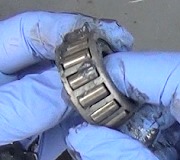Befuddled, my mechanic thought perhaps defective rotors were installed. Genuine VW parts were not used. Because he was very skeptical, and had never seen rotors fail that quickly, he looked for any other brake related problems. They changed a brake line, and one other thing I cannot remember, but had explained to me that every possible thing that could be changed/fixed was the 2nd time they changed the rotors and pads again. He questioned my braking style. However, my argument was why would I not need rotors for the first 7 years of my car's driving history with me, have them replaced and then have my braking style make the rotors fail about 6 months later. Driver error didn't seem to make sense.
So. Here I am now with an appt. To change the rotors again, this time using genuine VW rotors. I am feeling like this is a bandaid approach and have fears that even with the VW rotors, in about 1/2 a yr. I will end up with the same pulsating when the brakes are applied. The pulsating always starts out small and barely noticeable, as it progressively gets worse and worse. Someone suggested going to a new mechanic but I have been loyal to this shop b/c they are good guys and I have never had trust issues with them. The first time I paid for a full repair. The second time they only charged me for the parts. I do not know what they plan to do for this 3rd rotor replacement as far as the bill but I would be nervous to start somewhere new and the dealer's hourly charges are outrageous.
Any thoughts on what is going on with my braking system? Thanks! Kim
SPONSORED LINKS
Saturday, November 17th, 2007 AT 5:41 PM



